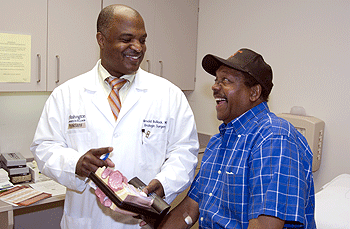Arnold Bullock’s mentors helped him see a world of possibilities for himself in science and medicine, and he has made the most of those opportunities.

Today, as a urologist and associate professor of surgery, he relishes the role of helping students realize that they, like him, can make their mark in medicine.
Bullock, M.D., was not the least bit daunted when he began his studies at The Johns Hopkins School of Medicine in 1983, although he had attended predominantly African-American schools virtually since kindergarten.
“By the time I made it to the ‘real’ world, the non-African-American world, I felt confident that I could compete and succeed,” he says.
Bullock knew he wanted to be a doctor by the time he finished his sophomore year of high school. He was the third in a family of four boys, and his parents — both schoolteachers — pushed education as a way for their sons to overcome racial barriers and achieve their full potential.
He rode public transportation with his brothers from their home in suburban Maryland to an all-boys Catholic high school in Washington. Mamie Jiles, one of the school’s science teachers, made a point of taking her students on field trips to the National Institutes of Health, the Food and Drug Administration and the Federal Bureau of Investigation, where they met scientists and saw them working in a variety of fascinating jobs.
“I think this opened our eyes to opportunities we never knew existed,” Bullock says. “It gave me a sense that I could do that, too. I was already doing well academically, but that degree of exposure and encouragement was all it really took for me to think I could have a career in medicine.”
Bullock set his sights on surgery after attending a lecture series for high school students hosted by the American Heart Association. Bullock’s older brother Mike had encouraged him to attend as a way to meet girls, but instead, Bullock became enthralled with the heart and cardiovascular disease.
“At the end of the five weeks, we were given a written test, and I got the second-highest score,” he says.
For this achievement, he had his pick of some 40 summer internships in a heart-related field. Bullock chose to work with Levon Cauthran, M.D., of Howard University, one of the few African-American cardiac surgeons at the time.
Cauthran also maintained a research laboratory where he studied how narrowing of renal arteries contributes to high blood pressure. Bullock’s father had severe hypertension, and several times a year, he would be hospitalized to get his blood pressure under control.
“My experience with Dr. Cauthran, coupled with my father’s chronic hypertension, gave me a sense of direction,” he says.
Days before Bullock was to leave for his freshman year at the University of Notre Dame, his father became critically ill with a tear in his aorta, the large vessel that carries blood from the heart to the rest of the body. Because of his history of severe hypertension, his father was a poor candidate for surgery to repair the tear, and he declined to undergo the risky procedure.

His illness prevented Bullock’s father from working, and even with a generous academic scholarship to Notre Dame, it quickly became clear that enrolling there would be too much of a financial struggle for his family. Instead, Xavier University in New Orleans, where Bullock also had been accepted, agreed to reinstate his full academic scholarship.
“Going to Xavier was one of the best decisions of my life,” Bullock says. “There, I gained a great deal of confidence in my own abilities, and I knew I would take that with me to medical school and beyond.”
At The Johns Hopkins School of Medicine, Bullock was leaning toward cardiac surgery until he had the opportunity to work under Patrick Walsh, M.D., an internationally renowned urologic surgeon who had trained many Washington University urologists.
“He was a great mentor — very encouraging, well respected and a great surgeon,” Bullock says.
That experience led Bullock to consider urologic surgery as a specialty. After graduating, he came to WUSTL for his residency and internship because of its reputation for having one of the top urology training programs in the country.
“My training experience here was so good that I wanted to stay and practice here, and I did,” he says.
Over the years, Bullock’s practice has become more specialized. He still treats patients with prostate cancer, but he also sees men with infertility problems and erectile dysfunction — conditions that are difficult for many men to discuss.
“In addition to his surgical expertise, Arnold is a great communicator,” says Gerald Andriole, M.D., professor and chief of urologic surgery. “He has a way of simplifying complicated medical jargon and putting patients at ease so they feel comfortable talking about sensitive health issues. He also runs a support group for men with side effects related to prostate cancer that is very popular. His talk on sexual dysfunction is disarmingly charming, and couples really open up after they have heard him speak.”
Many more men have erectile dysfunction than will admit it, Bullock says, and it has become a major health issue.
“What many men don’t realize is that erectile dysfunction might be their first sign of a more significant medical problem,” Bullock says.
The condition often is traced to high blood pressure, diabetes, depression or a cardiac arrhythmia. While the pharmaceutical industry has been criticized for marketing drugs directly to patients, Bullock says that in this case, he does not mind the attention drug treatments for erectile dysfunction have received.
“Whichever way patients bring it up to their doctor, I’m appreciative of that,” he says. “What is discouraging is if doctors don’t take that information to find out what is at the root of the patient’s erectile dysfunction. That’s an opportunity too often missed.”
As a surgeon with special expertise in prostate cancer, Bullock is fully aware that African-American men are twice as likely as white men to be diagnosed with the disease and to die from it.
|
Arnold Bullock, M.D. Hometown: Capitol Heights, Md. Education: B.S., biology, Xavier University, New Orleans, 1983; M.D., The Johns Hopkins School of Medicine, 1987 Family: Wife, Marjorie; children, Dominique, 18; Arnold Jr., 16; and Thomas, 15 Hobbies: Skiing, traveling, flying (Bullock has his pilot’s license and flies a single-engine prop plane) |
Historically, African-Americans distrust the medical system, particularly research institutions, and they often have a negative outlook on cancer treatment and a more optimistic picture of their own individual state of health. This thinking translates into African-Americans, particularly men, participating in cancer screening at a much lower rate than whites.
For years, Bullock has spoken at African-American churches and social groups to encourage more cancer screening. His own studies illustrate some of the barriers to participation.
If he goes to a church where worshipers are African-American, for example, and offers onsite prostate cancer screening, more than 90 percent will get tested, he says. But if, instead, he gives the men free tickets for prostate cancer screening and tells them that he personally will do the exam at his office, only 10 percent will show up.
“This is both disheartening and enlightening,” Bullock says. “Disheartening that they don’t participate in screening, but enlightening in that we need to recognize what works and what doesn’t.”
Dione M. Farria, M.D., associate professor of radiology, notes that Bullock has been “instrumental in building a team of community partners to conduct prostate cancer screening and education in the local African-American community. He is an engaging speaker who has the unique combination of clinical expertise and a knack for connecting with community members,” she says.
Because of these strengths, he was named co-leader of the Program to Eliminate Cancer Disparities’ Prostate Cancer Community Partnership.
Bullock also uses his appearances to help young people in the audience become aware of the world of opportunities that exist for them in the field of medicine and to offer himself as a mentor.
“I tell them if they’re interested in medicine to call me, and I offer to let high school students shadow me for a day,” he says. “There are so many barriers to completing this craft for underprivileged students. I encourage young people not to take the quick prize — a job right out of high school or college — but to stay in the game and aim for a career in science or medicine.”
Although he maintains a busy practice, Bullock appreciates the time he spends with his wife, Marjorie, and three teenagers. His wife works as a parent-teacher educator in the Normandy School District, where she teaches teen mothers and encourages them to stay in school.
Together as a family, they love skiing and traveling. Bullock also has a newfound passion: flying. He got his pilot’s license five years ago and enjoys taking to the skies in a single-engine prop plane out of the Spirit of St. Louis Airport.